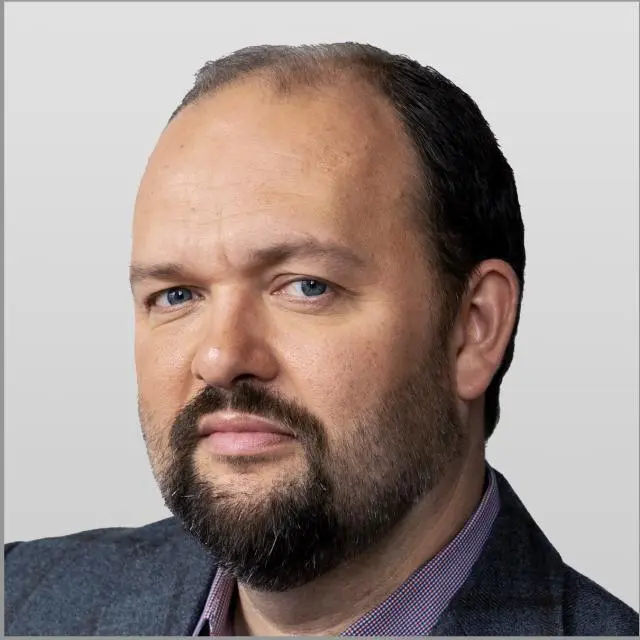Ross Douthat Kicks Off Point/Counterpoint Series

Ross Douthat, a conservative, Catholic opinion columnist for The New York Times, joined Rachel and Michael Deutch Professor of Philosophy Alexander George and Professor of Philosophy Nishi Shah in the kick-off for this semester’s Point/Counterpoint series. Douthat discussed the complexities of the 2024 U.S. Presidential election, highlighting the need to understand diverse perspectives.
Douthat began the talk by reflecting on his upbringing. Having grown up in a liberal household and attended Harvard University, he described himself as a natural contrarian. Douthat said his ability to discuss politics with people he strongly disagrees with stems from his respect for both conservative and liberal thought.
“You have to have an appreciation for how contingent so many of our ideas and beliefs are, and how if you had a different set of experiences, you would have a different set of perspectives,” Douthat said.
George opened the lecture by asking why any reasonable individual who cares for the nation and planet would cast their vote for Donald Trump. He referenced Douthat’s opinion piece published a few days before the election, which claimed that “the question of whom to vote for can’t be that obvious, or we wouldn't be where we are.”
Douthat asserted that personal morals were not enough of a determining factor in the election and that a majority of Trump voters were taking a gamble when they submitted their ballots.
“[Trump’s] second presidency is a gamble, and it could end disastrously,” he said.
Douthat posed a hypothetical to explain why someone with a personal distaste for Trump may have voted for Trump over Vice President Kamala Harris. He argued that many Americans voted for Trump, even if they did not like him, because they believed a Harris administration would make the world more unsafe.
When asked about the most likely effects of a second Trump presidency, Douthat said students and faculty should prepare for greater scrutiny of colleges that support affirmative action and allow student protests concerning the war in Gaza. He also predicted that university endowments would be taxed at higher rates.
Douthat also expressed extreme disappointment in higher education’s failed commitment to intellectual diversity.
“There’s been a massive dereliction of duty of universities over the last 20 years,” he said. “I think it’s absurd that there are so few actual conservative academics of any kind on America’s elite campuses, because I think conservative ideas are reasonable and deserve representation.”
Given this, he said, higher endowment taxes would be justified.
Some students in the audience were dissatisfied with Douthat's arguments. Gent Malushaga ’25 said that there’s no reliable way to ensure total intellectual diversity within a school’s faculty. Malushaga also criticized Douthat’s affirmative take on increased endowment tax rates.
“University endowments are not hedge funds, as he described them to be, and taxing them would make it even harder for schools to recruit and hire faculty from across the intellectual spectrum,” Malushaga said, “I also don’t think the government should be able to remove an institution’s tax-exempt status because it doesn’t promote a certain ideology. That’s an incredibly slippery slope.”
Others felt that Douthat’s arguments were well-grounded, but found his methods lacking. Caroline Coletti ’28 said, “I didn’t find many of Douthat’s points controversial, but some of his extreme hypotheticals stood out. They helped make his arguments clearer but often relied on big assumptions.”
Despite some disagreements on certain topics, students generally appreciated hearing from Douthat and hope that the college continues to invite speakers with opinions that differ from the majority of the Amherst community.
“Open discussions with people who think differently than ourselves can help us understand their logic and maybe even rethink our own beliefs,” Coletti said. “In today’s current political state, having these conversations is really important to remain unified during such a divisive time.”
Malushaga felt similarly. “If you don’t understand the other side of an argument, you can’t be sure that yours is correct," he said. “After listening to Douthat explain his viewpoints in a clear, logical manner, I left feeling really confident about the ways in which I disagreed with him.”